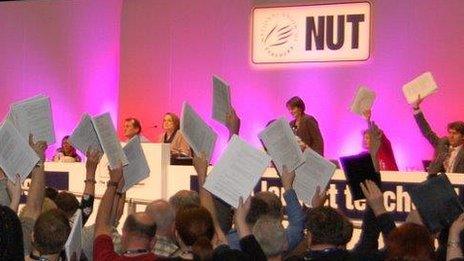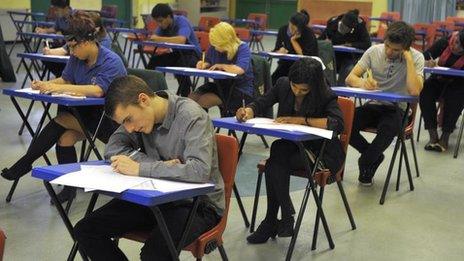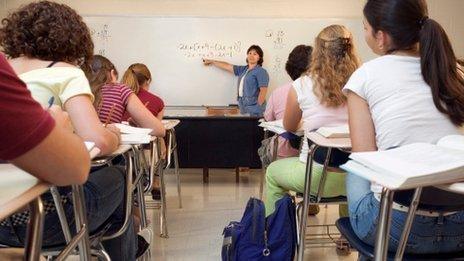National Union of Teachers votes for strike in June
- Published
Jerry Glazier from the NUT says the workload placed on teachers must "come right down"
The National Union of Teachers' conference has voted for a strike that could close schools in England and Wales in the week beginning 23 June.
The union's conference in Brighton has also decided to consult teachers on further action in the autumn term.
The strikes are part of a long-running campaign over teachers' pay and workload.
The Department for Education said strikes would "damage the profession's reputation".
Delegates chanted "Gove must go" as they backed calls for a campaign that could see a summer term classroom walk-out.
The other biggest classroom teachers' union, the NASUWT, has also threatened to take industrial action in the run-up to next year's general election.
'Disrupt'
Delegates at the NUT conference on Monday agreed that unless "significant progress" is made in talks with the government, there will be plans for a national strike in the summer term.

The NUT conference heard calls for the "next phase in our battle"
The conference called for a pay deal which would make up for "cuts in pay suffered by teachers since 2010".
It opens the door for an escalation of the dispute, with a decision to consult union members about more strikes in the autumn term and into 2015.
The conference also backed a national demonstration, a lobby of Parliament and a broad-based campaign to challenge the government's education policy.
But the conference had earlier rejected a more hardline proposal to commit the union to four days of strikes in the autumn.
Anne Lemon, of the union's executive, told the conference: "This is the next phase in our battle against this government.
"We've got to send the message out loud and clear."
"If we take strike action one day and maybe another one six months later and we don't make any real progress, we've got two choices.
"One choice is that we give up. The second choice is that we step up. Our members are for stepping up."
'Maximum pressure'
Jerry Glazier, of the union's executive, said teachers needed to put "maximum possible pressure" on the coalition government to "radically change their damaging policies towards education".
There are GCSE and A-level exams scheduled to be taken on the first three days of the week of proposed strike action in June.
But the union's general secretary, Christine Blower, said strike action "will not disrupt exams" and that any staff who need to supervise an exam will be given exemptions from taking part in industrial action.

Exams are scheduled for some days during the proposed week of a teachers' strike
Ms Blower said that Education Secretary Michael Gove should engage with the union on "education policies, on workload and accountability, teacher pay including performance related pay and his unfair pension changes".
"If the strike happens it will be Michael Gove's fault," she said.
"Teacher morale is at a dangerously low ebb. Changes to pay, pensions and a working week for many teachers of 60 hours are driving many out of the classroom.
"According to Ofsted, two in five teachers leave the profession within five years of starting teaching. Ministers must act on workload, as well as pay and pensions to halt this."
Top graduates
A Department for Education spokeswoman rejected the need for strike action and said that changes to pay and conditions gave greater flexibility to heads and teachers.
"Ministers have met frequently with the NUT and other unions and will continue to do so.
"Further strike action will only disrupt parents' lives, hold back children's education and damage the reputation of the profession," she said.

The NUT staged a one-day strike last month that affected thousands of schools
"We know that the vast majority of our teachers and school leaders are hardworking and dedicated professionals. That is why we are giving teachers more freedoms than ever and cutting unnecessary paperwork and bureaucracy.
"In fact, teaching has never been more attractive, more popular or more rewarding. A record number of top graduates are now applying to become teachers and there have never been more teachers in England's classrooms, with a rise of 9,000 in the last year.
"It is important that teachers work closely with school leaders to ensure that their workload is manageable. We trust the professionalism of our head teachers to monitor their staff's workload and address any issues."
- Published19 April 2014

- Published20 April 2014

- Published21 April 2014

- Published20 April 2014
